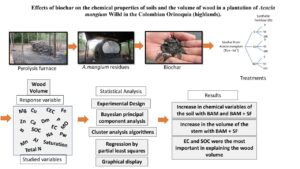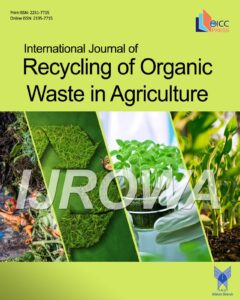
Purpose: Vegetable waste (VW) could cause environmental problems if not properly managed. Due to rural living conditions and a relatively low residence density, VW is usually disposed of in landfills. Waste management should be engineered in a way to process the waste into value-added products in a sustainable manner. This review evaluates four bioprocessing techniques […]

Purpose: Phosphorus mobilization (PM) in tropical Regosols may be harmful to the environment and water quality. It is expected that high contents of soluble phosphorus in sandy soils may promote the P leaching through the transport of the available phosphorus from the soil surface to deeper layers. This study aimed to evaluate the PM in […]
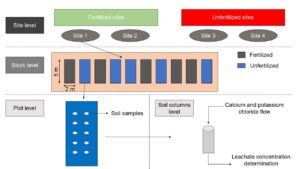
Purpose: The study was undertaken with a purpose of at source bioconversion of wet kitchen waste. To accelerate the “Zero Waste Concept” and meet the UN’s Sustainable Development Goals 2015. Method: Wet waste was mixed with dry paper, cardboard material and a microbial culture was inoculated in the bag. Proper mixing of the material enhanced […]
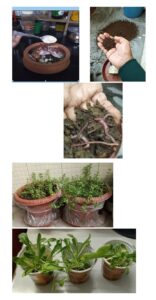
Purpose: Floral waste, as a frequently overlooked resource for sustainable agriculture, can be harnessed to produce nutrient-rich soil amendments resulting in an enhancement of soil fertility and augment crop yields. This in turn can foster a circular economy, minimizing waste disposal and promoting a green economy. This study was aimed to explore the potential of […]
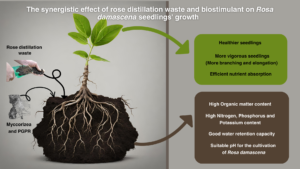
Purpose: The use of sewage sludge associated with natural rock-based fertilizers can increase nutrient solubility and soil fertility. From this perspective, this study evaluated changes in the chemical soil attributes and the nutrient availability rate after the application of sewage sludge, natural phosphate, and elemental sulfur in soils with different clay contents. Method: The study […]

Purpose: In the current study, the effects of compost, natural, and synthetic superabsorbent amendments on soil water retention curve (WRC) were assessed by applying RETC software in a laboratory trial. Moreover, the effects of the mentioned materials on vegetation growth indices of four plants in three different soil textures of urban green space were evaluated. […]
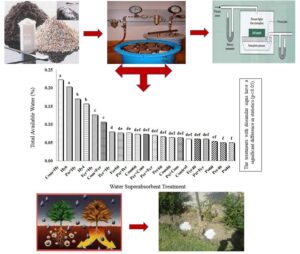
Purpose: Vermicomposting of phenolics-rich lignocellulosic materials takes a long time to reach maturity, while worm mortality and weight loss are often encountered. Phenolic compounds have antimicrobial properties which may affect the vermicomposting process. The present study aims at investigating the effect of the initial total phenolic content (TPC) on coir pith vermicomposting. Method: The earthworm […]
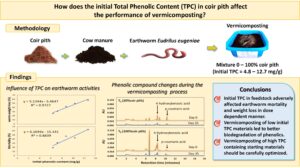
Purpose: The study examines the efficacy of using recycled abattoir waste fertilizer as a sustainable nutrient input for crop Production. Method: Two pot experiments were set up in a controlled environment room to examine biomass yields of ryegrass (Lolium perenne AberMagic), grain yields of spring wheat (Triticum aestivum KWS Cochise), and their micro and macronutrient […]
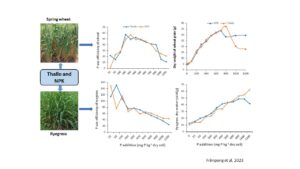
Purpose: This study aimed to investigate the potential of actinomycetes in mitigating the environmental impact of olive mill wastewaters (OMWW) on plant-soil system. The objectives were to investigate the impacts of varying doses of OMWW on soil microflora, and to analyze the enzymatic profile of a selected group of isolated actinomycetes. Method: A physico-chemical characterization […]
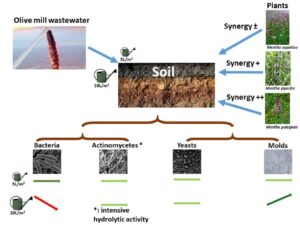
Purpose: The current study aimed to figure out the types and dosages of biocomposts supplied with cellulose-degrading Trichoderma strains for ameliorating soil properties, and the growth and yield of pineapple. Method: The experiment with two factors followed a completely randomized block design, including 20 treatments (4 replications). The first factor (A) was the types of […]
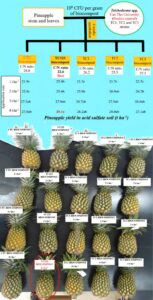
Purpose: This study aimed to investigate the effects of vermicompost leachate on the growth and water use of tomatoes in an unequal distribution of salinity in a hydroponic system. Method: Roots of tomato seedlings were separated into approximately two equal parts, each half was grown in a media culture part containing a 3-liter perlite and […]
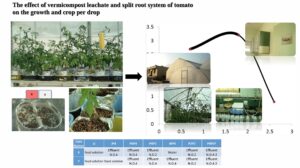
Purpose: Exploring alternatives to mitigate soil degradation has been gaining importance in recent years. Biochar promises to improve properties such as soil fertility and soil conditioning. This research involved an experiment with different levels of biochar in associating it with some chemical properties and the wood yield of A. mangium. Method: We used a design […]
